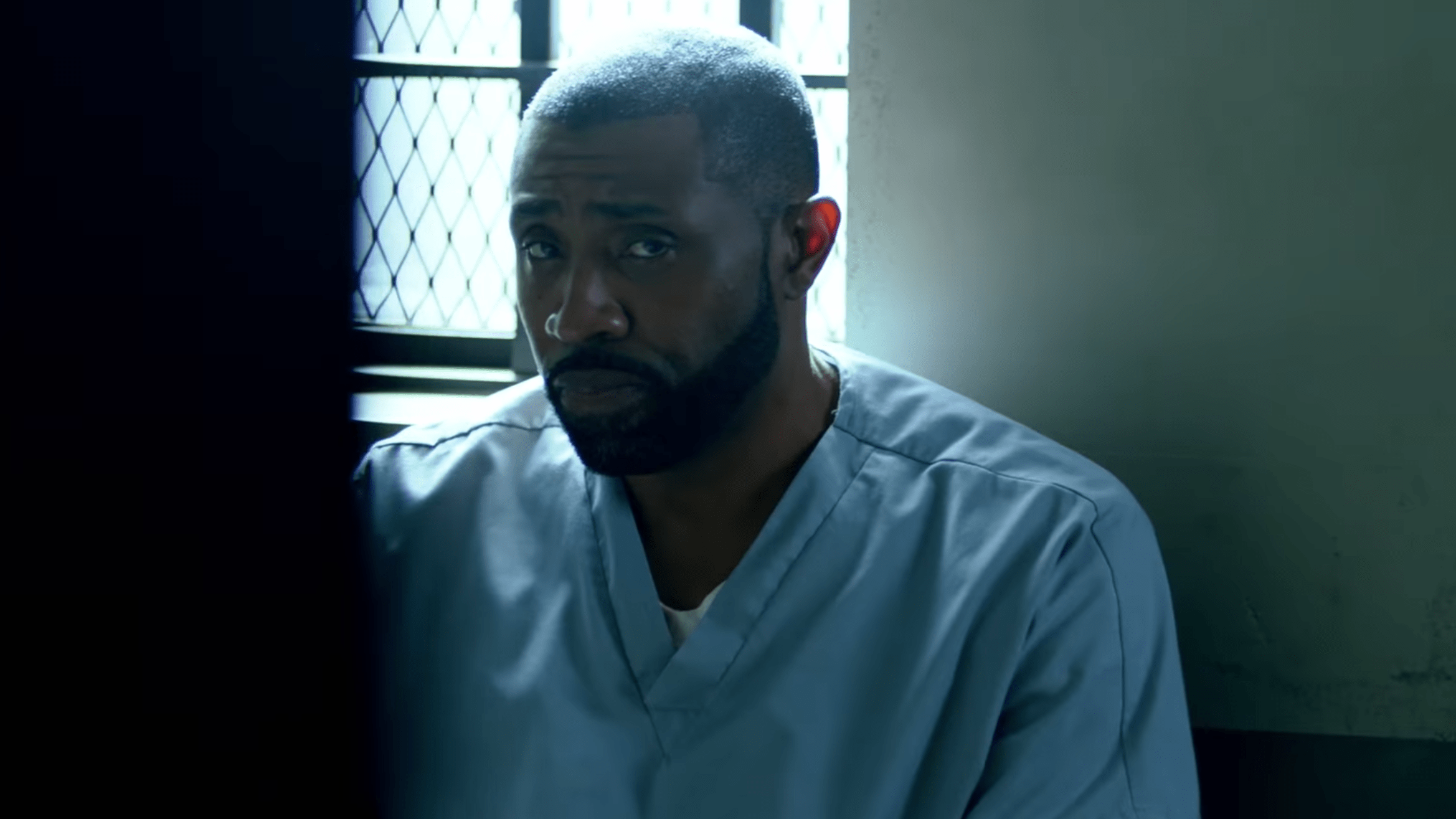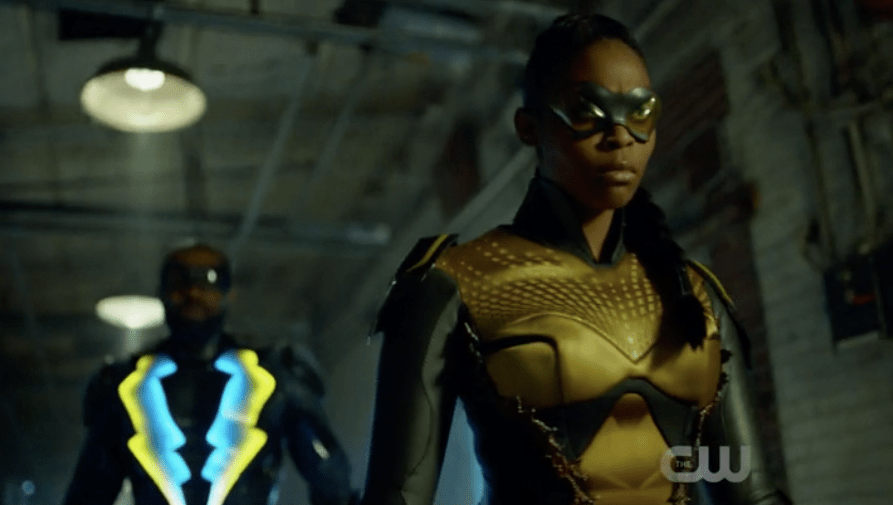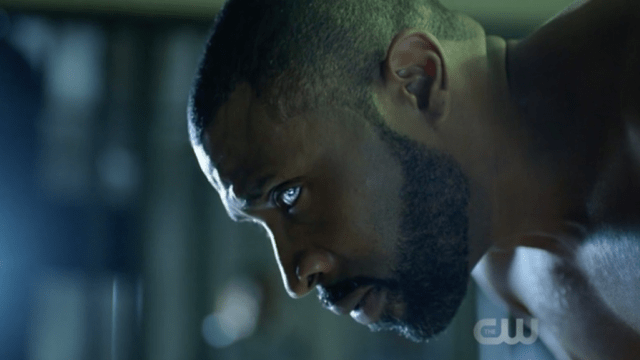As much as we may like to believe that our favourite live-action television shows are constantly breaking the mould, the truth of the matter is that we’ve been making and consuming broadcast TV for well over 70 years and there aren’t that many stories that have yet to be done.
Black Lightning‘s “Black Jesus: The Book of Crucifixion” is not the first episode of its kind that the CW has produced across its wide line of TV shows based on DC’s comic books. But it’s hands-down one of the best-executed and most resonant examples of a tried and true superhero trope that the network’s been doing for years.

It’s an unwritten rule that all comic book stories (and those based on them) about masked vigilantes with secret identities must at some point introduce a plot in which the hero is wrongly accused of committing a crime they had no involvement in, usually after being framed by their arch-nemesis. These stories are meant to strip superheroes of their larger-than-life grandeur and remind us that beneath that skin-tight Spandex and excessive eyeshadow, capes are still people just like us who can be made vulnerable.
Because these particular kinds of stories are so overdone, though, it’s rare that they achieve their intended effect. Instead, they end up rehashing a number of the same narrative beats over and over again, making dozens of episodes from different shows across the years feel wildly derivative of one another. “Black Jesus: The Book of Crucifixion” is a perfectly fine hour of television all on its own, but what makes the episode really shine is the context that Black Lightning puts it in by having established this particular world over the course of the past few weeks.
Now that Black Lightning and Thunder are targeting ASA labs and storage facilities all across Freeland, the evil organisation has redoubled its efforts to take out the older hero by going after him in his civilian identity.
As Jefferson and Anissa bond over their vigilantism, Garfield High vice principal/newly-revealed ASA agent Kara Fowdy initially grapples with her orders to kill Jeff, who she refuses to believe is Black Lightning. But it isn’t long before she’s coordinating with the Freeland PD to plant Green Light in Jeff’s car and have him arrested, all as cover to eliminate one of the only people who can save the city – and potentially expose him as Black Lightning in the process. Rather than leaving the threat of Jefferson’s arrest looming in the background, “The Book of Crucifixion” gets right to the point and manifests the man’s fears in the most devastating way.

Jefferson in the Freeland jail.Image: CW
Arrest warrants in hand, the Freeland police swarm Garfield High in the middle of the school day, drawing the attention of virtually the entire student body as they ransack the principal’s car, “discover” the drugs he’d allegedly been selling to students, and frogmarch him out of the building in handcuffs.
For Jefferson, a pillar of Freeland’s predominantly black community, the arrest is a traumatic event on multiple levels that “The Book of Crucifixion” is careful to slow down and highlight. There’s the immediate shame of being accused of allegedly selling drugs, but it’s the message of seeing their black principal being dragged from the school in handcuffs by white police officers that hits Jeff. Though his work as Black Lightning is part of his plan to save Freeland, it’s his work as an educator that Jeff sees as the most important part of his connection to the community. It’s the hope and inspiration he’s fighting to instill in them that has the power to keep them safe long after he’s gone and those are things that the arrest – even just the visuals of it — threatens.
There’s a moment as Jeff’s being led to a police cruiser when he passes a shaken Jennifer and he implores her to keep calm, a plea that’s both for her own safety and everyone else’s who might get hurt in the event that her newfound powers suddenly flare out of control. The scene echoes Black Lightning‘s very first episode when Jennifer and Anissa watch as their father was pulled over and patted down by a policeman who knows that he has no business bothering the Pierces.
Though the settings and circumstances are different, both of these moments are about the subtle violence of institutionalized racism — like publicly humiliating a black leader as a means of ensuring that those who believe in him lose their faith. But “The Book of Crucifixion” goes further. We see in detail everything that happens to Jeff when the police bring him in for booking. The beating, the body-searching, the cavity inspection are all acts meant to dehumanize and shame him, and he’s helpless to do anything but keep his powers in check in order to not fully expose himself.
Even though “The Book of Crucifixion” quickly sets about putting its heroes onto the ASA’s plot and alliance connections to the corrupt police, the episode very smartly highlights that, for Black Lightning, a big part of his connection to Freeland comes down to optics. Again, this in and of itself isn’t exactly a novel concept for a cape show, but it’s in moments like these that all of the important, rich groundwork that Black Lightning‘s been laying proves its value.
The story of a superhero fighting to clear their name after being framed by the police isn’t a new one, but it takes on a particular resonance in Black Lightning, both because its titular hero is a black man and because we live in a time in which stories about the police killing innocent unarmed black people are a damn-near daily occurrence. “The Book of Crucifixion” is about the danger posed when a hero’s identity is almost revealed, but it’s also about the wholly-justified fear that many black people are confronted with simply for being black in the presence of the police. It’s the kind of story that not many superhero shows have the guts to do, but it’s one that Black Lightning is telling excellently.

Black Lightning and Thunder facing off against some ASA goons.Image: CW
Assorted Musings:
- I am here for Kara Fowdy’s villain vice principal chic looks. Also, more supervillains who have day jobs as public school administrators, please.
- It’s particularly heavy that Kara, the Judas to Jeff’s Jesus, is a black woman who sells him out to the corrupt white police detective Cayman, who leads Jeff’s arrest.
- Put “you gotta bring arse to get arse” on my grave.
- I’ve never really been much of fan of superheroes with themed vehicles, but Thunder and Black Lightning really need to get some sort of electric car to zip around the city in because they look silly as hell running around in the street.
- So it turns out Black Lightning‘s universe is actually full of metahumans, they have all just been in the ASA’s stasis pods. This was one of the few weird quirks about the show that made you wonder how the second season was going to go about introducing even more metas into the mix, but… now we know.
